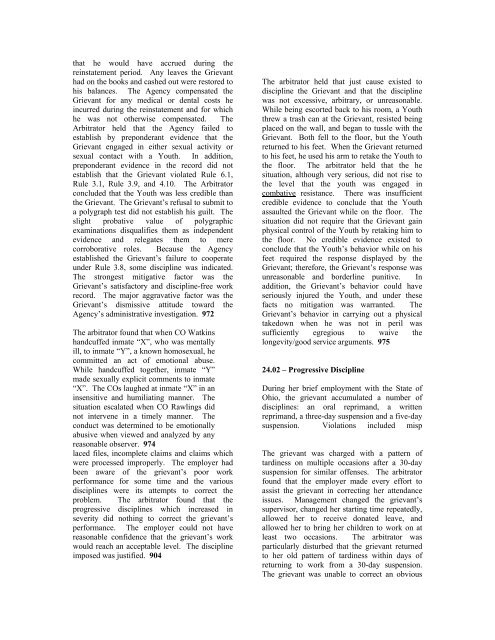by Contract Number (PDF) - OCSEA
by Contract Number (PDF) - OCSEA
by Contract Number (PDF) - OCSEA
Create successful ePaper yourself
Turn your PDF publications into a flip-book with our unique Google optimized e-Paper software.
that he would have accrued during the<br />
reinstatement period. Any leaves the Grievant<br />
had on the books and cashed out were restored to<br />
his balances. The Agency compensated the<br />
Grievant for any medical or dental costs he<br />
incurred during the reinstatement and for which<br />
he was not otherwise compensated. The<br />
Arbitrator held that the Agency failed to<br />
establish <strong>by</strong> preponderant evidence that the<br />
Grievant engaged in either sexual activity or<br />
sexual contact with a Youth. In addition,<br />
preponderant evidence in the record did not<br />
establish that the Grievant violated Rule 6.1,<br />
Rule 3.1, Rule 3.9, and 4.10. The Arbitrator<br />
concluded that the Youth was less credible than<br />
the Grievant. The Grievant’s refusal to submit to<br />
a polygraph test did not establish his guilt. The<br />
slight probative value of polygraphic<br />
examinations disqualifies them as independent<br />
evidence and relegates them to mere<br />
corroborative roles. Because the Agency<br />
established the Grievant’s failure to cooperate<br />
under Rule 3.8, some discipline was indicated.<br />
The strongest mitigative factor was the<br />
Grievant’s satisfactory and discipline-free work<br />
record. The major aggravative factor was the<br />
Grievant’s dismissive attitude toward the<br />
Agency’s administrative investigation. 972<br />
The arbitrator found that when CO Watkins<br />
handcuffed inmate “X”, who was mentally<br />
ill, to inmate “Y”, a known homosexual, he<br />
committed an act of emotional abuse.<br />
While handcuffed together, inmate “Y”<br />
made sexually explicit comments to inmate<br />
“X”. The COs laughed at inmate “X” in an<br />
insensitive and humiliating manner. The<br />
situation escalated when CO Rawlings did<br />
not intervene in a timely manner. The<br />
conduct was determined to be emotionally<br />
abusive when viewed and analyzed <strong>by</strong> any<br />
reasonable observer. 974<br />
laced files, incomplete claims and claims which<br />
were processed improperly. The employer had<br />
been aware of the grievant’s poor work<br />
performance for some time and the various<br />
disciplines were its attempts to correct the<br />
problem. The arbitrator found that the<br />
progressive disciplines which increased in<br />
severity did nothing to correct the grievant’s<br />
performance. The employer could not have<br />
reasonable confidence that the grievant’s work<br />
would reach an acceptable level. The discipline<br />
imposed was justified. 904<br />
The arbitrator held that just cause existed to<br />
discipline the Grievant and that the discipline<br />
was not excessive, arbitrary, or unreasonable.<br />
While being escorted back to his room, a Youth<br />
threw a trash can at the Grievant, resisted being<br />
placed on the wall, and began to tussle with the<br />
Grievant. Both fell to the floor, but the Youth<br />
returned to his feet. When the Grievant returned<br />
to his feet, he used his arm to retake the Youth to<br />
the floor. The arbitrator held that the he<br />
situation, although very serious, did not rise to<br />
the level that the youth was engaged in<br />
combative resistance. There was insufficient<br />
credible evidence to conclude that the Youth<br />
assaulted the Grievant while on the floor. The<br />
situation did not require that the Grievant gain<br />
physical control of the Youth <strong>by</strong> retaking him to<br />
the floor. No credible evidence existed to<br />
conclude that the Youth’s behavior while on his<br />
feet required the response displayed <strong>by</strong> the<br />
Grievant; therefore, the Grievant’s response was<br />
unreasonable and borderline punitive. In<br />
addition, the Grievant’s behavior could have<br />
seriously injured the Youth, and under these<br />
facts no mitigation was warranted. The<br />
Grievant’s behavior in carrying out a physical<br />
takedown when he was not in peril was<br />
sufficiently egregious to waive the<br />
longevity/good service arguments. 975<br />
24.02 – Progressive Discipline<br />
During her brief employment with the State of<br />
Ohio, the grievant accumulated a number of<br />
disciplines: an oral reprimand, a written<br />
reprimand, a three-day suspension and a five-day<br />
suspension. Violations included misp<br />
The grievant was charged with a pattern of<br />
tardiness on multiple occasions after a 30-day<br />
suspension for similar offenses. The arbitrator<br />
found that the employer made every effort to<br />
assist the grievant in correcting her attendance<br />
issues. Management changed the grievant’s<br />
supervisor, changed her starting time repeatedly,<br />
allowed her to receive donated leave, and<br />
allowed her to bring her children to work on at<br />
least two occasions. The arbitrator was<br />
particularly disturbed that the grievant returned<br />
to her old pattern of tardiness within days of<br />
returning to work from a 30-day suspension.<br />
The grievant was unable to correct an obvious
















